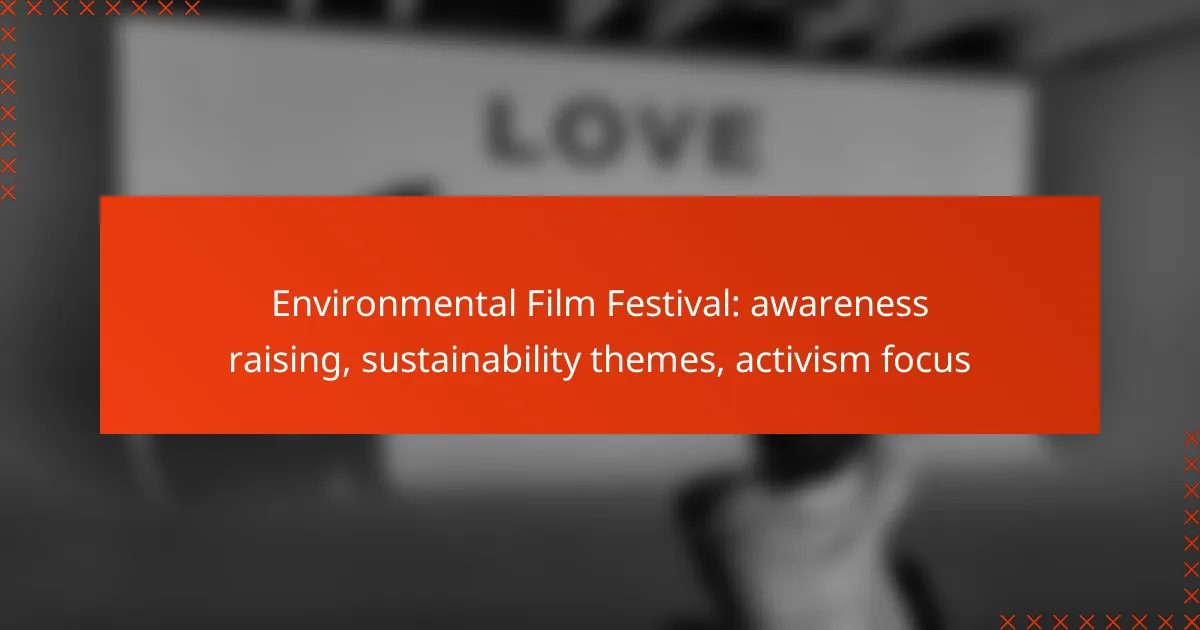Environmental Film Festivals in Australia serve as a vital platform for raising awareness about sustainability themes and pressing environmental issues. By showcasing impactful films, these festivals engage communities, spark meaningful discussions, and inspire activism, encouraging audiences to take action on critical challenges like climate change and biodiversity conservation.

How do Environmental Film Festivals raise awareness in Australia?
Environmental Film Festivals in Australia raise awareness by showcasing films that highlight sustainability themes and environmental issues. These festivals engage communities, spark discussions, and promote activism through various interactive formats.
Community engagement through screenings
Screenings at Environmental Film Festivals serve as a platform for community engagement, allowing audiences to connect with pressing environmental issues. Local venues often host these events, making them accessible to a wide range of participants.
By featuring films that resonate with local concerns, festivals encourage attendees to reflect on their own environmental impact. Post-screening discussions can further enhance this engagement, fostering a sense of community responsibility.
Panel discussions with filmmakers
Panel discussions featuring filmmakers provide an opportunity for deeper insights into the films and the issues they address. These discussions often include Q&A sessions, allowing the audience to interact directly with creators and experts.
Such dialogues can illuminate the filmmaking process and the challenges of environmental activism, inspiring attendees to take action. Filmmakers often share personal stories that resonate with viewers, making the issues more relatable and urgent.
Collaborations with local NGOs
Collaborating with local NGOs enhances the impact of Environmental Film Festivals by connecting audiences with organizations actively working on environmental issues. These partnerships can facilitate resource sharing and amplify the reach of both the festival and the NGOs.
NGOs often set up informational booths at festivals, providing attendees with actionable steps they can take to support sustainability efforts. This synergy not only raises awareness but also encourages community involvement in local environmental initiatives.

What sustainability themes are highlighted in Australian Environmental Film Festivals?
Australian Environmental Film Festivals focus on critical sustainability themes such as climate change impacts, conservation of biodiversity, and renewable energy solutions. These themes aim to raise awareness and inspire action among audiences regarding pressing environmental issues.
Climate change impacts
Climate change impacts are a central theme in many Australian Environmental Film Festivals, showcasing how rising temperatures and extreme weather events affect ecosystems and communities. Films often illustrate the consequences of climate change on agriculture, water resources, and wildlife, emphasizing the urgency of addressing these challenges.
Viewers are encouraged to consider their carbon footprints and make lifestyle changes that contribute to climate resilience. Simple actions, such as reducing energy consumption and supporting local initiatives, can collectively make a significant difference.
Conservation of biodiversity
The conservation of biodiversity is highlighted through films that depict the rich variety of Australian flora and fauna and the threats they face from habitat loss and pollution. These films often feature conservation efforts and success stories, inspiring viewers to engage in local conservation projects.
Understanding the importance of biodiversity is crucial, as it supports ecosystem health and resilience. Audiences are urged to participate in activities such as tree planting and wildlife protection to help preserve Australia’s unique natural heritage.
Renewable energy solutions
Renewable energy solutions are presented as viable alternatives to fossil fuels, with films showcasing innovations in solar, wind, and other sustainable energy sources. These films often highlight successful community projects and government initiatives that promote the transition to cleaner energy systems.
Individuals can support renewable energy by advocating for policies that favor sustainable practices and considering options like solar panels for their homes. Engaging in discussions about energy efficiency and sustainability can further drive community-wide changes toward a greener future.

How do Environmental Film Festivals promote activism?
Environmental Film Festivals promote activism by raising awareness about sustainability issues and inspiring audiences to take action. Through powerful storytelling and engaging visuals, these festivals highlight critical environmental challenges and motivate individuals and communities to get involved in activism.
Encouraging audience participation
Environmental Film Festivals often include interactive elements that encourage audience participation, such as Q&A sessions, panel discussions, and workshops. These activities allow attendees to engage directly with filmmakers and experts, fostering a deeper understanding of the issues presented in the films.
Many festivals also provide platforms for audiences to share their own stories and experiences related to environmental activism. This can create a sense of community and empower individuals to take action in their own lives.
Showcasing grassroots movements
These festivals frequently highlight grassroots movements that are making a significant impact on local and global environmental issues. By showcasing the work of community organizations and activists, festivals can amplify their messages and inspire others to join their efforts.
For example, a film might document a local group’s successful campaign to reduce plastic waste, encouraging attendees to support similar initiatives in their own communities. This visibility can lead to increased funding and volunteer support for grassroots efforts.
Partnering with activist organizations
Environmental Film Festivals often collaborate with activist organizations to enhance their impact. These partnerships can provide resources, expertise, and networks that help amplify the festival’s message and reach a broader audience.
Collaborations may include co-hosting events, providing informational booths, or organizing joint campaigns. Such partnerships can create a more cohesive movement, linking the power of film with actionable steps for sustainability and activism.

What are the key criteria for selecting films in these festivals?
Key criteria for selecting films in environmental film festivals include their relevance to pressing environmental issues, the quality of storytelling, and the diversity of perspectives presented. These factors ensure that the films not only entertain but also educate and inspire action towards sustainability.
Relevance to environmental issues
Films must address significant environmental challenges, such as climate change, biodiversity loss, and pollution. A strong connection to current events or pressing ecological concerns enhances the film’s impact and relevance.
For example, documentaries that highlight local environmental struggles or global crises resonate more with audiences and can stimulate discussions and activism. Selecting films that align with the festival’s mission to raise awareness about sustainability is crucial.
Quality of storytelling
The effectiveness of a film often hinges on its storytelling quality. Engaging narratives that evoke emotions and provoke thought can leave a lasting impression on viewers. Strong character development and compelling visuals are essential components that elevate a film’s storytelling.
Films that weave personal stories with broader environmental themes tend to resonate well, making complex issues more relatable. A well-crafted narrative can inspire viewers to take action or change their perspectives on environmental issues.
Diversity of perspectives
Incorporating a variety of viewpoints is essential for a comprehensive understanding of environmental issues. Films that showcase different cultures, communities, and experiences can highlight the multifaceted nature of sustainability challenges.
For instance, featuring indigenous voices or marginalized communities can provide insights into unique environmental practices and struggles. This diversity not only enriches the viewing experience but also fosters a more inclusive dialogue around environmental activism.

How can filmmakers submit their work to Australian Environmental Film Festivals?
Filmmakers can submit their work to Australian Environmental Film Festivals by following specific submission guidelines, meeting entry deadlines, and utilizing designated submission platforms. Each festival may have unique requirements, so it’s essential to review the details for each event.
Submission guidelines
Submission guidelines typically include criteria such as film length, format, and thematic relevance to environmental issues. Most festivals prefer films that highlight sustainability, activism, or ecological awareness. Filmmakers should ensure their work aligns with these themes to increase the chances of acceptance.
Additionally, filmmakers may need to provide a synopsis, director’s biography, and promotional materials. It’s advisable to prepare these documents in advance to streamline the submission process.
Deadlines for entries
Entry deadlines for Australian Environmental Film Festivals usually fall several months before the festival date. Filmmakers should check individual festival websites for specific dates, as they can vary significantly. Early submissions often benefit from reduced fees, so planning ahead is beneficial.
Many festivals offer multiple deadlines, including early bird, regular, and late submission dates. Be mindful of these timelines to avoid missing out on opportunities.
Submission platforms
Filmmakers can submit their works through various online platforms, such as FilmFreeway and Withoutabox, which are commonly used for film festival entries. These platforms provide a user-friendly interface for uploading films and managing submissions.
Some festivals may also have their own dedicated submission portals. Always verify the preferred submission method for each festival to ensure compliance with their requirements.

What impact do these festivals have on local communities?
Environmental film festivals significantly enhance local communities by fostering awareness and engagement around sustainability issues. They serve as platforms for education, activism, and community building, often inspiring attendees to take action in their own lives.
Increased environmental awareness
Environmental film festivals play a crucial role in increasing awareness about ecological issues. By showcasing films that highlight pressing environmental challenges, these festivals educate audiences on topics such as climate change, biodiversity loss, and pollution.
Attendees often leave with a deeper understanding of how their daily choices impact the planet. For instance, films that illustrate the effects of plastic pollution can motivate viewers to reduce single-use plastics in their own lives.
Moreover, discussions and panels featuring experts can provide practical insights on sustainability practices, encouraging community members to adopt greener habits. This collective knowledge can lead to a more environmentally conscious community overall.



